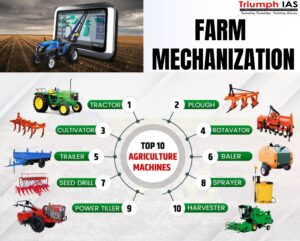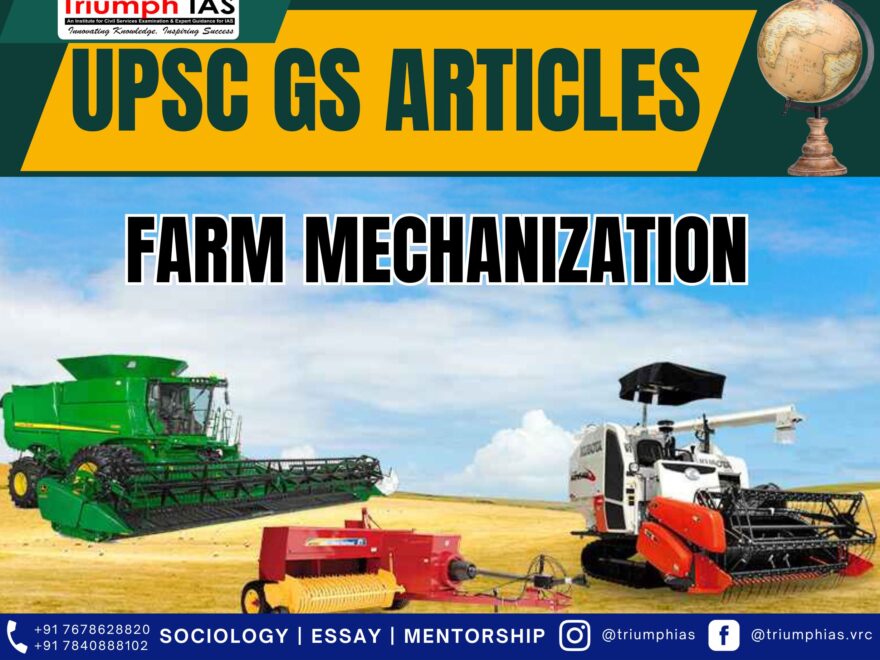Farm mechanization: Boost to farm productivity and employment opportunities
(Relevant for General Studies Paper | Economics| Prelims/Mains)

Farm mechanization: Boost to farm productivity and employment opportunities
As per a recently published white paper by the National Council of Applied Economic Research (NCAER), the agricultural machinery sector in India encounters notable hurdles in fulfilling the requirements of small and marginal farmers.
The agricultural machinery sector grapples with challenges on both the demand and supply fronts. Mechanization in Indian agriculture, standing at 40-45%, lags far behind global standards; for instance, the corresponding figures are 95% in the US, 75% in Brazil, and 57% in China.
Despite the suboptimal levels of farm mechanization in India, shortages in skills and a lack of awareness among farmers regarding technology and machinery management present considerable impediments to advancement.
Farm mechanizationAgricultural mechanization, commonly referred to as farm mechanization, is the utilization of machinery and equipment to either replace or support human and animal labor in diverse agricultural activities. This entails embracing technology, including tractors, harvesters, seeders, irrigation systems, and other automated tools, to execute tasks that were conventionally performed manually. The key objectives of farm mechanization encompass enhancing efficiency, productivity, and profitability in agriculture, all the while alleviating the physical strain on farmers. Moreover, mechanization has the potential to contribute positively to sustainable agricultural practices by optimizing resource utilization and mitigating the environmental impact of farming activities. Need for farm mechanization
Farm Machinery IndustryThe Agricultural Machinery Industry constitutes a sector involved in the manufacturing and provision of various machinery, equipment, and tools essential for agricultural and farming tasks like ploughing, planting, harvesting, and more. These machines are crafted to enhance productivity and efficiency in farming operations, catering to both small-scale and large-scale farming needs. Within this industry, products such as tractors, combine harvesters, irrigation systems, tillers, and more are offered to meet the diverse requirements of agricultural practices. |
Challenges with the Farm Machinery Industry
- Skills Shortage: The scarcity of skills stands as a critical challenge, creating a situation of low equilibrium for the industry. At the base of the industry hierarchy, village craftsmen constitute the largest group, mainly serving Indian farmers by providing, repairing, and maintaining farm machinery.
- Lack of Adequate Information: Insufficient information and awareness among farmers about technology and machinery management are evident. As a result, their machinery choices are often subpar, leading to wasted investments.
- Lack of Skilled Personnel: Micro, Small, and Medium Enterprises (MSMEs) grapple with a shortage of skilled personnel. Semi-skilled workers, lacking proper equipment, frequently fabricate agricultural tools and machinery. The absence of qualified supervisors in small-scale fabrication poses challenges in ensuring quality. Additionally, the task of finding qualified personnel for testing machinery is a daunting one.
- High Capital Cost: The cost of farm machinery is high, and farmers may lack the resources to invest in new equipment. This can result in limited access to the latest technology and decreased efficiency in farming operations.
- Rapidly Changing Technology: Farm machinery technology is advancing swiftly, necessitating continuous research and development investments by manufacturers. This poses a challenge for smaller manufacturers who may lack the resources for quick innovation.
- Dependence on Weather Conditions: Farm machinery is highly reliant on weather conditions, and adverse weather can lead to delays and disruptions in farming operations. This, in turn, can lead to decreased productivity and profitability.
- Maintenance and Repair: Regular maintenance and repairs are essential for keeping farm machinery running efficiently. However, this process can be both costly and time-consuming, particularly for smaller farmers who may lack the resources for proper equipment maintenance.
- Environmental Concerns: Growing concerns about the environmental impact of farming, including the use of fossil fuels in farm machinery, are prevalent. Manufacturers face pressure to develop more sustainable and environmentally friendly equipment.
What steps should be taken to leverage the benefit of farm mechanization industry
- Training Young Farmers/Owners/Operators: Responsibility for educating young farmers/owners/operators on the selection, operation, and maintenance of farm machinery should be assigned to tractor training centers, Krishi Vigyan Kendras, and the industry. Additionally, they should disseminate information on advancements in mechanization, including the availability of new and improved farm equipment for various applications.
- Strengthening Front-line Demonstration: Enhancing front-line demonstrations of farm machinery is crucial, and providing hands-on training to users of next-generation farm machinery could promote the extension and adoption of farm power.
- Addressing Skilling Shortages: The Agricultural Skills Council of India should focus on addressing skills shortages at the district level. Public-private partnerships with Custom Hiring Centres can prove especially beneficial, and the Indian Council of Agricultural Research (ICAR) institutes can offer short courses to tackle skills shortages on the demand side. Leveraging Industrial Training Institutes (ITIs) to bridge skill gaps in repair and maintenance is essential, and promoting service centers at the regional and state levels in the private and industrial sectors is recommended.
- Provisioning Available Technical Knowledge and Skills: Collaboration between the District Industries Centre and local industrial clusters is necessary for ITIs to offer pertinent courses with the latest technical knowledge and skills. Implementing dual vocational skilling programs would greatly benefit industrial clusters in tier-II and tier-III cities. Additionally, MSMEs should take advantage of the Central Government’s Apprentices Policy.
Farm machine industry could become a golden opportunity in boosting farm productivity and generating employment .
Reference: The Hindu
Related Blogs…
 |
 |
Frequently Asked Questions:
1. Question: What is the current level of farm mechanization in India compared to global standards?
Answer: Farm mechanization in India stands at 40-45%, significantly lower than countries like the US (95%), Brazil (75%), and China (57%).
2. Question: How can farm mechanization contribute to cost reduction in agriculture?
Answer: Farm mechanization can reduce input costs by approximately 20% while potentially increasing yields by up to 30%.
3. Question: What are the challenges faced by the farm machinery industry in India?
Answer: Challenges include skills shortage, lack of adequate information among farmers, high capital costs, rapidly changing technology, and environmental concerns.
4. Question: How can training and education play a role in promoting farm mechanization?
Answer: Training young farmers and operators on machinery selection, operation, and maintenance is essential. Collaboration with institutions and skill development programs can help bridge skill gaps.
5. Question: What are the key objectives of farm mechanization in Indian agriculture?
Answer: The key objectives include enhancing productivity, reducing the physical strain on farmers, promoting sustainability, and addressing labor shortages during peak seasons.
GS Related Practices Questions…
To master these intricacies and fare well in the Sociology Optional Syllabus, aspiring sociologists might benefit from guidance by the Best Sociology Optional Teacher and participation in the Best Sociology Optional Coaching. These avenues provide comprehensive assistance, ensuring a solid understanding of sociology’s diverse methodologies and techniques.
META TAGS:
Farm mechanization, Agricultural machinery, Employment opportunities, Agricultural productivity, Challenges, Farm machinery industry, Skilled personnel, Sustainability, Training, Indian agriculture

Why Vikash Ranjan’s Classes for Sociology?
Proper guidance and assistance are required to learn the skill of interlinking current happenings with the conventional topics. VIKASH RANJAN SIR at TRIUMPH IAS guides students according to the Recent Trends of UPSC, making him the Best Sociology Teacher for Sociology Optional UPSC.
At Triumph IAS, the Best Sociology Optional Coaching platform, we not only provide the best study material and applied classes for Sociology for IAS but also conduct regular assignments and class tests to assess candidates’ writing skills and understanding of the subject.
Choose The Best Sociology Optional Teacher for IAS Preparation?
At the beginning of the journey for Civil Services Examination preparation, many students face a pivotal decision – selecting their optional subject. Questions such as “which optional subject is the best?” and “which optional subject is the most scoring?” frequently come to mind. Choosing the right optional subject, like choosing the best sociology optional teacher, is a subjective yet vital step that requires a thoughtful decision based on facts. A misstep in this crucial decision can indeed prove disastrous.
Ever since the exam pattern was revamped in 2013, the UPSC has eliminated the need for a second optional subject. Now, candidates have to choose only one optional subject for the UPSC Mains, which has two papers of 250 marks each. One of the compelling choices for many has been the sociology optional. However, it’s strongly advised to decide on your optional subject for mains well ahead of time to get sufficient time to complete the syllabus. After all, most students score similarly in General Studies Papers; it’s the score in the optional subject & essay that contributes significantly to the final selection.
“A sound strategy does not rely solely on the popular
Opinion of toppers or famous YouTubers cum teachers.”
It requires understanding one’s ability, interest, and the relevance of the subject, not just for the exam but also for life in general. Hence, when selecting the best sociology teacher, one must consider the usefulness of sociology optional coaching in General Studies, Essay, and Personality Test.
The choice of the optional subject should be based on objective criteria, such as the nature, scope, and size of the syllabus, uniformity and stability in the question pattern, relevance of the syllabic content in daily life in society, and the availability of study material and guidance. For example, choosing the best sociology optional coaching can ensure access to top-quality study materials and experienced teachers. Always remember, the approach of the UPSC optional subject differs from your academic studies of subjects. Therefore, before settling for sociology optional, you need to analyze the syllabus, previous years’ pattern, subject requirements (be it ideal, visionary, numerical, conceptual theoretical), and your comfort level with the subject.
This decision marks a critical point in your UPSC – CSE journey, potentially determining your success in a career in IAS/Civil Services. Therefore, it’s crucial to choose wisely, whether it’s the optional subject or the best sociology optional teacher. Always base your decision on accurate facts, and never let your emotional biases guide your choices. After all, the search for the best sociology optional coaching is about finding the perfect fit for your unique academic needs and aspirations.
To master these intricacies and fare well in the Sociology Optional Syllabus, aspiring sociologists might benefit from guidance by the Best Sociology Optional Teacher and participation in the Best Sociology Optional Coaching. These avenues provide comprehensive assistance, ensuring a solid understanding of sociology’s diverse methodologies and techniques. Sociology, Social theory, Best Sociology Optional Teacher, Best Sociology Optional Coaching, Sociology Optional Syllabus.
Best Sociology Optional Teacher, Sociology Syllabus, Sociology Optional, Sociology Optional Coaching, Best Sociology Optional Coaching, Best Sociology Teacher, Sociology Course, Sociology Teacher, Sociology Foundation, Sociology Foundation Course, Sociology Optional UPSC, Sociology for IAS,
Follow us :



Find More Blogs…
| Compare and contrast Karl Marx’s and Max weber’s | Karl Marx- Historical Materialism |
| Talcott Parsons : Social system | Scope of the subject and comparison with other social sciences |




